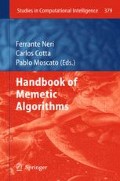What Is Optimization?
In every day life, we always have to make decisions, e.g. the path to choose in order to go back home from work, the brand of milk in a supermarket, whether to watch football or a movie on TV, etc. Some of these choices appear to us obvious while some other choices require some thinking. Regardless of the context, decisions are usually made in order to reach a certain goal or satisfy a given necessity. For example, in the case of going back home from work, a reasonable goal would be to choose a path which leads us back home in the shortest possible time. Let us assume that the path should be performed by walking. In this case, the solution for the problem is likely to be the shortest path. This would be a simple optimization problem. If the goal would be to be at home at the earliest time after having bought something in the city center, e.g. a visit a shop, we have to exclude some of the possible paths. More specifically, we have to take into account only the paths which pass through the shop. The path having the latter features are said to be feasible while all the others are infeasible. The newly stated problem is a constrained optimization problem. If an additional goal, beside being back at home in the shortest possible time, is to take the opportunity for having some physical activities by means of a long walk, two conflicting objectives must be taken into account and a compromise must be accepted (e.g. a path that is not too long as to get home reasonably early but also not too short as to have at least some physical activity). Due to the presence of two simultaneous and conflicting goals, the latter is a multi-objective optimization problem.
Access this chapter
Tax calculation will be finalised at checkout
Purchases are for personal use only
Preview
Unable to display preview. Download preview PDF.
Author information
Authors and Affiliations
Editor information
Editors and Affiliations
Rights and permissions
Copyright information
© 2012 Springer-Verlag Berlin Heidelberg
About this chapter
Cite this chapter
Neri, F., Cotta, C. (2012). Basic Concepts. In: Neri, F., Cotta, C., Moscato, P. (eds) Handbook of Memetic Algorithms. Studies in Computational Intelligence, vol 379. Springer, Berlin, Heidelberg. https://doi.org/10.1007/978-3-642-23247-3_1
Download citation
DOI: https://doi.org/10.1007/978-3-642-23247-3_1
Publisher Name: Springer, Berlin, Heidelberg
Print ISBN: 978-3-642-23246-6
Online ISBN: 978-3-642-23247-3
eBook Packages: EngineeringEngineering (R0)

